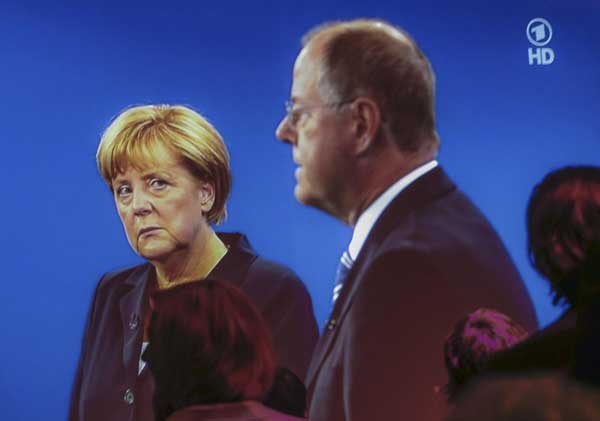Merkel in TV debate with rival before election
Updated: 2013-09-02 05:45
(Xinhua)
|
|||||||||||
BERLIN - German Chancellor Angela Merkel faces off her Opposition challenger Peer Steinbrueck on Sunday night in their only TV debate before the September 22 general election as polls have been suggesting Merkel will win a third term.
The 90-minute TV debate in Berlin was aired live on mainstream German channels as a panel of four interviewers set the agenda and questions that covered issues including taxes, wages, Germany's policy in the eurozone debt crisis, as well as the Syria crisis. An estimated audience of 15-20 million tuned in to the debate.
Both Merkel's conservative Christian Democratic Union (CDU) and Steinbrueck's centre-left Social Democrats (SPD) have campaigned mainly on domestic issues that dominated the debate.
Polls suggested that half of German voters watched the TV debate, while one in three said the debate could influence their choice. It is widely seen as Steinbrueck's last-ditch effort to win more hesitating voters as the elections will be held in just three weeks.
During the debate, Merkel took pride in Germany's low unemployment that is near the lowest levels since reunification in 1990,saying that Germany is the "motor of growth" and "anchor of stability" in Europe and she would like to continue the course.
Steinbrueck, for his part, stressed greater social justice and reiterated his plan to introduce a national minimum wage of 8.50 euros ($11.35 dollars) per hour, pointing to the fact that 7 million people earned less than the proposed minimum wage. He also wanted to raise taxes on incomes above 100,000 euros to 49 percent from 42 percent.
However, Merkel said such tax hike plans would risk spoiling the good situation in the country. German economy expanded by 0.7 percent in the second quarter of 2013 compared with the previous quarter, the strongest quarter-on-quarter growth since the first three months of 2012. Strong economy in Germany boosted confidence that the eurozone would be brought out of the on-going recession soon.
The CDU party rules out tax increases and supports minimum wage deals struck by employers and trade unions in different industry sectors and regions.
On the eurozone debt crisis, Steinbrueck called for more solidarity measures for indebted eurozone members including Greece. In response, Merkel insisted on structural reforms and spending cuts by indebted countries and said it is her responsibility as chancellor to keep the reform pressure on Greece.
Related Stories
Merkel makes historic visit to Nazis' Dachau camp 2013-08-21 07:05
Merkel launches whirlwind election campaign 2013-08-16 10:48
Merkel's rivals go on attack over US spying 2013-07-17 07:45
Obama, Merkel agree talks on surveillance program 2013-07-04 08:00
Li, Merkel vow to settle trade dispute 2013-05-27 11:06
Merkel makes surprise visit to Afghanistan 2013-05-11 08:40
Today's Top News
Trending news across China, Sept 2
France not to act alone on Syria: minister
Experts: US unwise to wage war on Assad
Eurasian nations focus on Net
Merkel in TV debate with rival
Manufacturing sees quick expansion
Sowing the seeds of sustained growth
SASAC head in graft probe
Hot Topics
Lunar probe , China growth forecasts, Emission rules get tougher, China seen through 'colored lens', International board,
Editor's Picks

|

|

|

|

|

|






